28+ Sample Custody Evaluation Reports
-
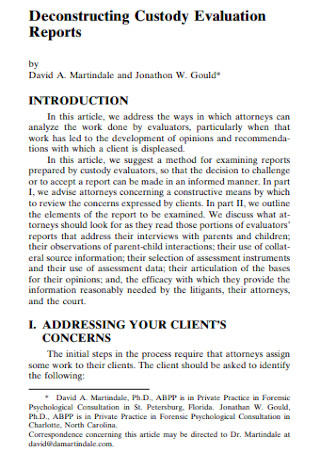
Deconstructing Custody Evaluation Report
download now -
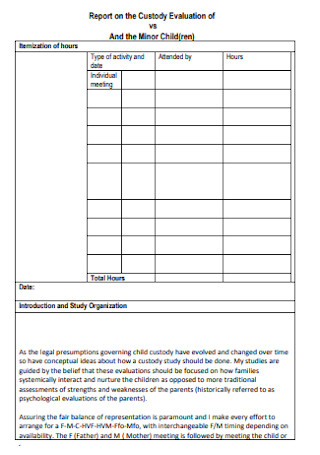
Report on Custody Evaluation of Ninor Child
download now -
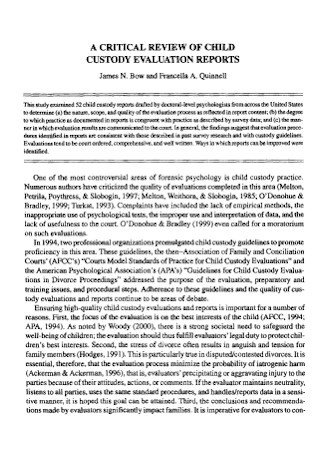
Child Custody Evaluation Report
download now -
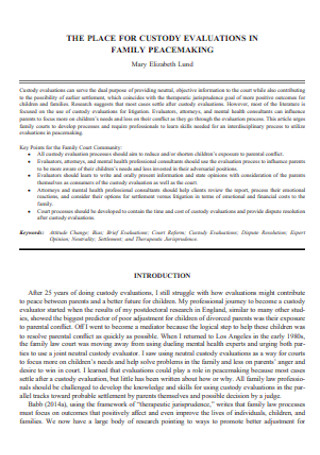
Place for Custody Evaluation Report
download now -
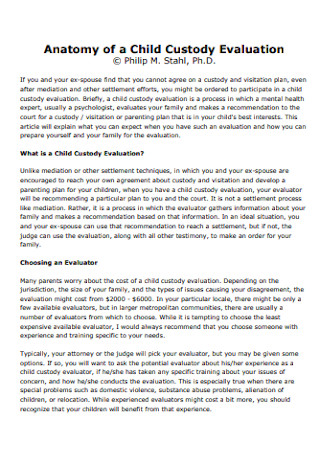
Anatomy of a Child Custody Evaluation Report
download now -
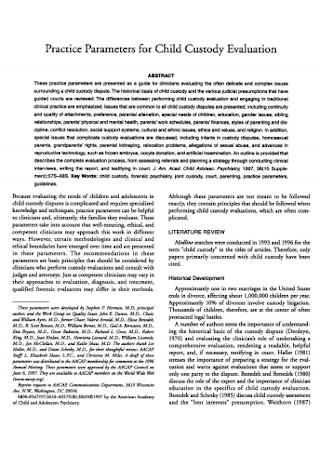
Parameters for Child Custody Evaluation Report
download now -
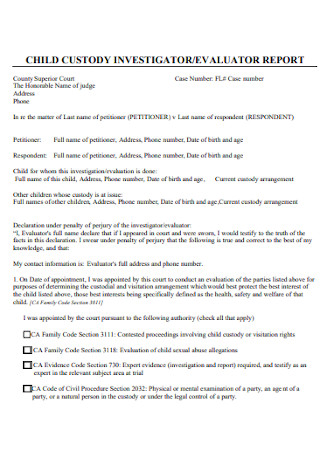
Custody Investigator Evaluation Report
download now -
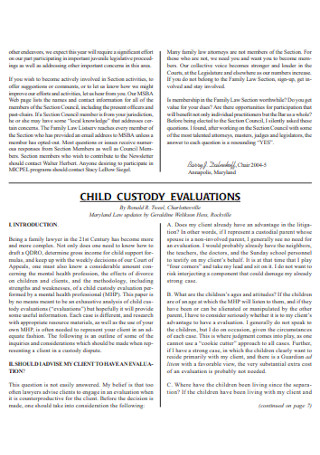
Custody Evaluation Report Format
download now -
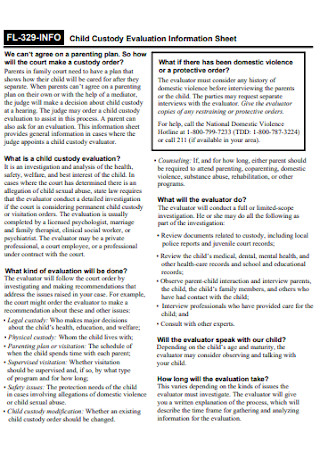
Child Custody Evaluation Sheet and Report
download now -
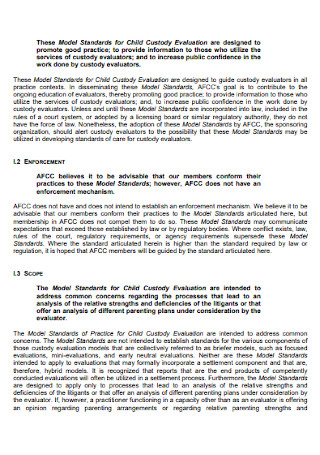
Child Custody Evaluation Report Template
download now -
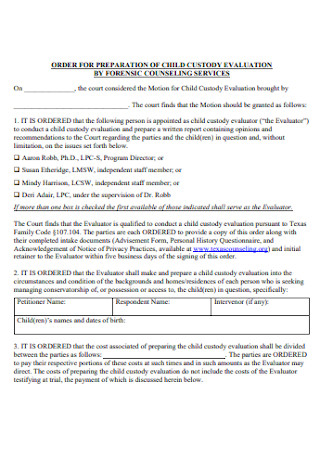
Cousiling Custody Evaluation Report
download now -
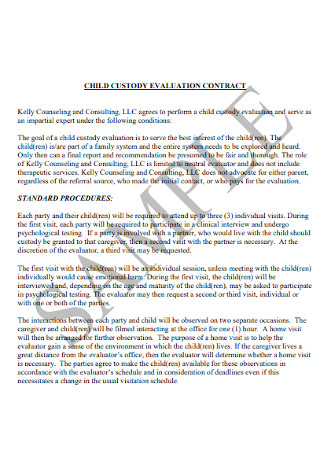
Custody Evaluation Contract Report
download now -
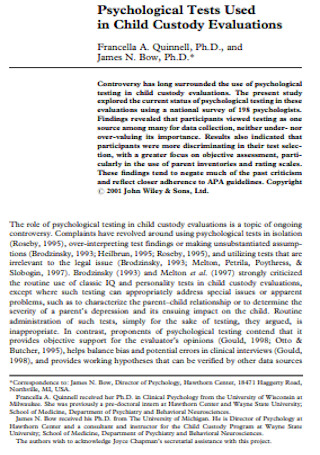
Pshycological in Custody Evaluation Report
download now -
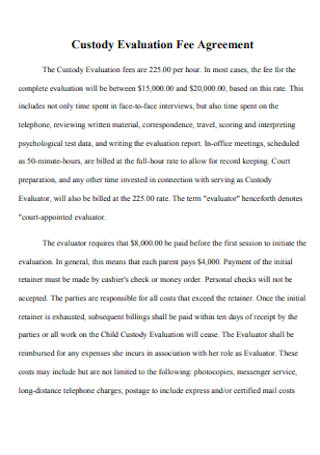
Custody Evaluation Fee Agreement Report
download now -
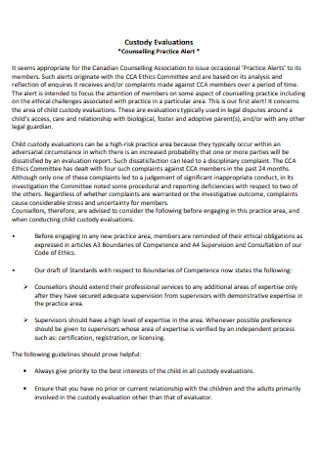
Sample Custody Evaluations Report
download now -
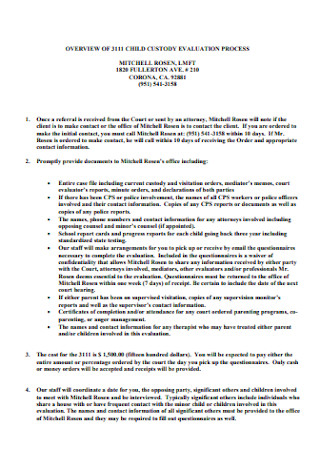
Custody Evaluation Process Report
download now -
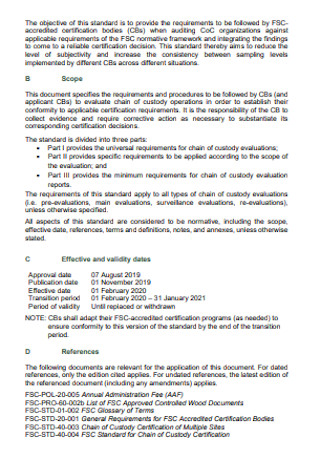
Chain of Custody Evaluation Report
download now -
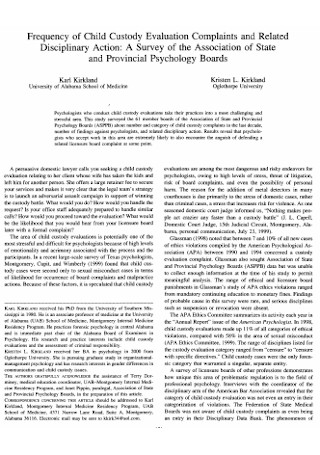
Frequency of Child Custody Evaluation Report
download now -
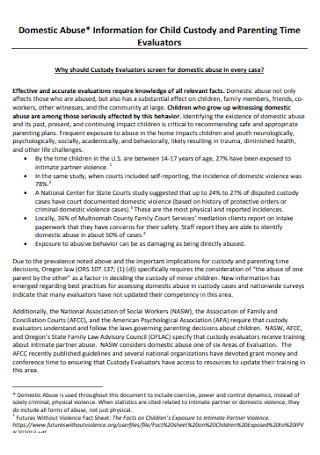
Custody and Parenting Time Evaluators Report
download now -
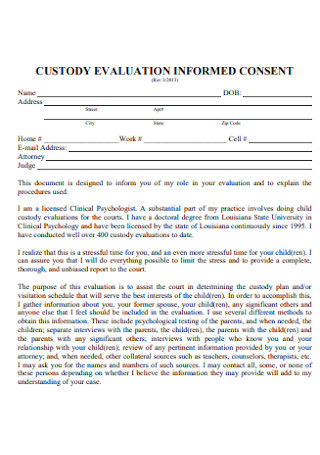
Coustody Evaluation Informed Consent Report
download now -
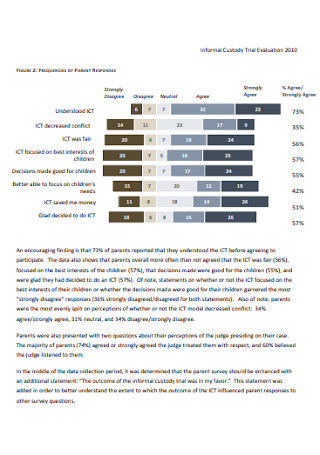
Custody Trial Evaluation Report
download now -
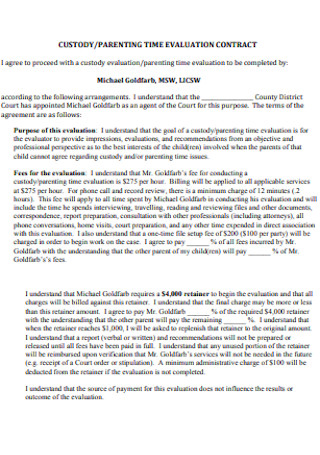
Custody Time Evaluation Report
download now -
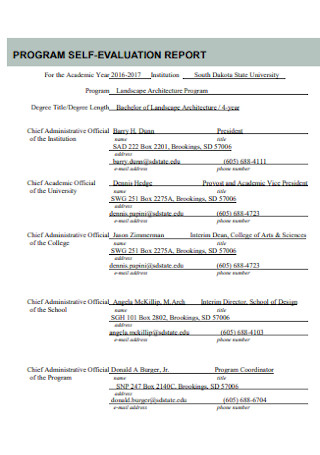
Custody Program Self Evaluation Report
download now -
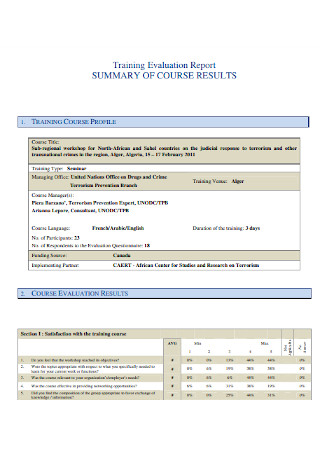
Custody Training Evaluation Report
download now -
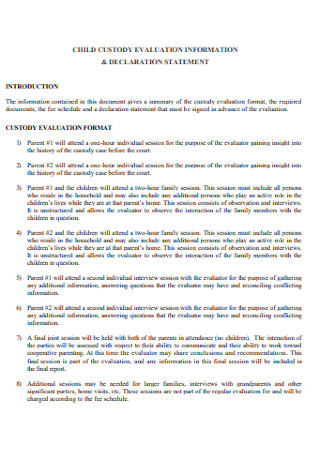
Custody Evaluation Information Report
download now -
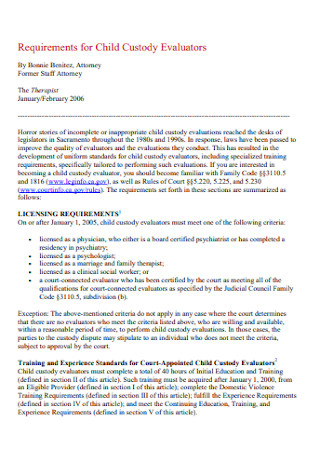
Requirements for Child Custody Evaluator Report
download now -
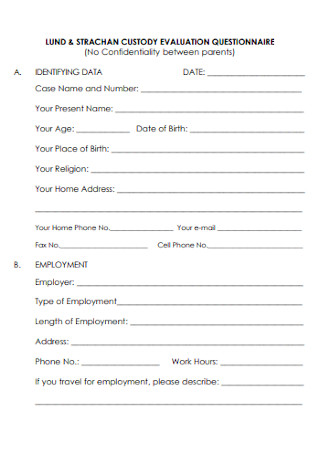
Custody Evaluation Report and Questionnaire
download now -
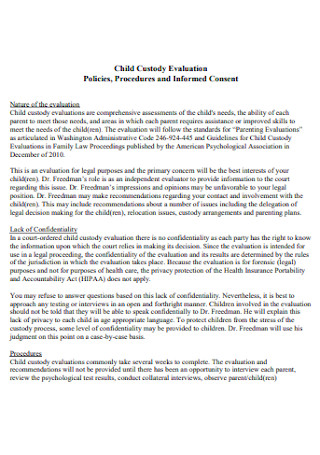
Custody Evaluation Policy Report
download now -
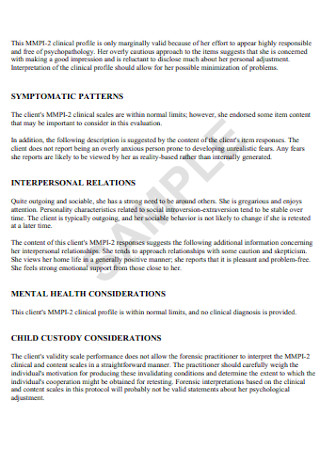
Child Custody Interpretive Report
download now
FREE Custody Evaluation Report s to Download
28+ Sample Custody Evaluation Reports
What Is a Custody Evaluation Report?
Key Players in a Custody Evaluation Report
Processes Involved in Custody Evaluation
Parts of a Custody Evaluation Report
How to Create a Custody Evaluation Report
FAQs
How do you win a custody evaluation?
What happens in a custody evaluation?
What is a family evaluation?
What Is a Custody Evaluation Report?
A custody evaluation report is a written report used in assessing a child’s situation in order to determine what is best for him or her. Parents and guardians are often the subject of these reports. Evaluators utilize a number of ways to determine who is in the best position to receive primary custody of the child.
According to the American Psychological Association, growing up in a happy home where healthy marriages are practiced, is good for a couple. It is even more beneficial for their children when the parents set a good relationship example for them to follow. However, the norm is far from the ideal. In the United States, around 40-50% of married couples divorce. Furthermore, succeeding marriages often pose an even higher divorce rate.
Key Players in a Custody Evaluation Report
Processes Involved in Custody Evaluation
There are several basic procedures in child custody evaluation. A psychologist is expected to produce an evaluation report as a final output. The mental health professional typically conducts the following processes to determine custody rights or recommendations.
Parts of a Custody Evaluation Report
Trained evaluators can either use standard forms or customize their reports according to their findings. The following examples are some of the usual components included in a custody evaluation report.
How to Create a Custody Evaluation Report
It is up to the evaluator to produce a comprehensive report. The substance and quality of the content will solely depend on the training and ability of the licensed professional. If you are tasked to create an evaluation report, make sure to follow these four basic steps:
Step 1: Input the Basic Information
Always start your evaluation report by stating the complete names of the parents, child or children, their addresses, and contact information. You may also include the dates of birth. Don’t forget to write the date and your own information as an evaluator.
Step 2: Summarize the Data Gathered
Compile all your findings from the interviews, psychological testing, and observations. Make sure to organize your information in such a way that it can be generally understood by the average reader. You want to avoid overly technical and clinic terms. Keep in mind that the evaluation report may be used in a court of law. Legal and non-legal persons should be able to comprehend the report.
Step 3: List Down the Recommendations
Obtaining data can take a number of weeks to complete; and the recommendations based on the data are an integral part of the overall output. An evaluator’s recommendations are necessary for authorities to reach an educated conclusion to determine what’s in the best interest of the child. It should answer the question as to who should get primary custody of the minor child. Possible outcomes may be that one parent gets sole custody, both have joint custody, or arrangements for visitation rights are created. All in all, the final report can carry considerable weight inside a court of law.
Step 4: Be Objective When Evaluating
The last step is more of a reminder. It’s always advisable to keep a level-head and remain objective and professional throughout the course of the evaluation. The last thing you want is people accusing you of favoring one parent over the other. This may be possible if the evaluator is a friend or an acquaintance of a parent. Avoid bias when it comes to your findings and recommendations. If it’s your view that both parents equally deserve custody of the child, then state it as such in your report. Lawyers can contest an evaluator’s findings and recommendations, so be sure you conduct your process in a fair and thorough manner.
FAQs
How do you win a custody evaluation?
For parents, having to go through a custody evaluation can result in a lot of stress. The problem is that most parents believe they are in the ideal position to support and care for their child or children, and not their spouse. Bitter feuds and tensions may ensue and not only do the relationships suffer, but the child is often caught in the middle. This poses potential harm because it threatens their overall stability and well-being. To win a custody evaluation, parents must not only convince the evaluators of their capacity and financial stability to provide for the child; but they should exhibit genuine concern and emotional support for the child.
What happens in a custody evaluation?
A custody evaluation usually entails several tactics that mental health professionals use to determine what is best for a child. A couple going through a divorce may be at odds when it comes to the living arrangement of their child or children. A professional evaluator can be brought in, either by the court or by the parents themselves, to help settle the dispute. A custody evaluation report combines family interviews, actual observations, and psychological testing to establish what the right measures are to be taken regarding custody.
What is a family evaluation?
A family evaluation is when a trained professional, usually a psychologist, assesses the family life and background of a couple together with the children. He or she may interview the children, the parents, and other close associates, either separately or as a group. The purpose of a family evaluation is to paint a picture of the relationship dynamics in a home and to judge whether or not the current situation is beneficial or detrimental to a child’s welfare.
Unfortunately, divorce is more common than most people think. It can be a traumatic and painful experience for a family. Custody battles and heated court debates can severely impact the mental health and emotional well-being of both children and adults alike. Custody evaluations carry a lot of emotional weight. They are not easy to deal with because of how much is at stake, especially for the parties involved. However, custody evaluations are meant to help the family, despite the difficulties of having to go through one. Browse through the many sample templates available above and create your own custody evaluation report!
